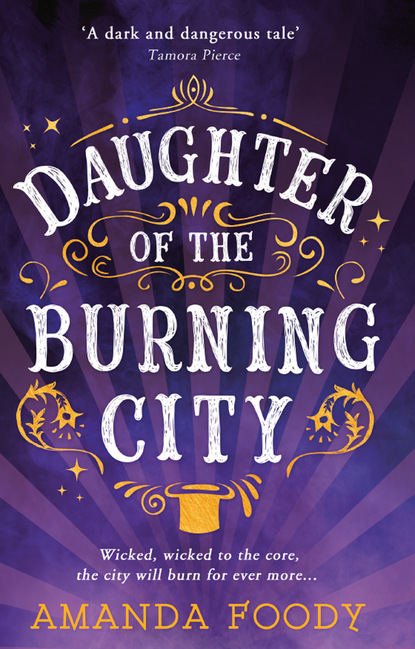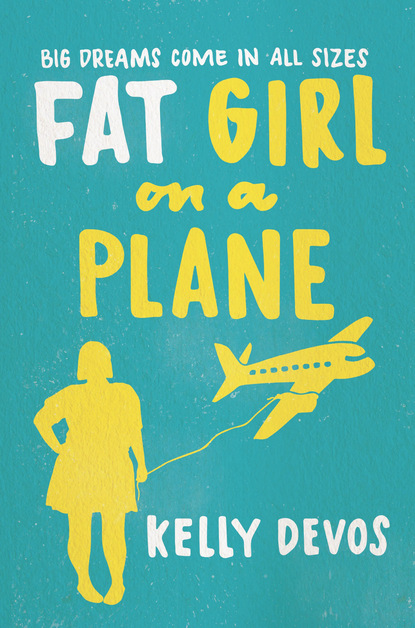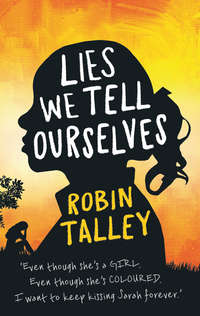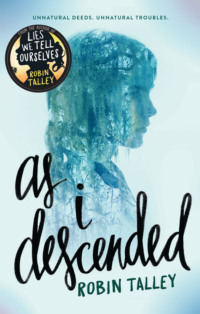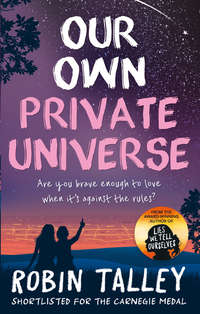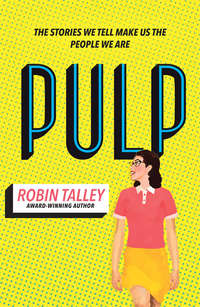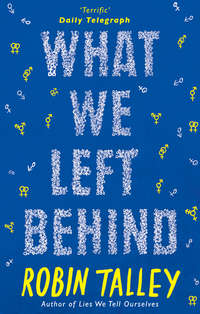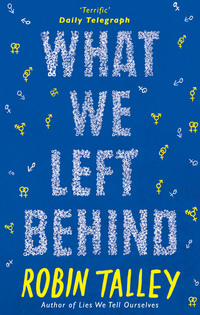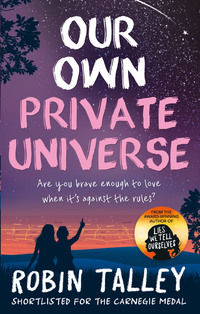
Полная версия
Music From Another World
I didn’t see how that was possible. As far as I knew, “falling in love” wasn’t any different from the made-up stories we learned in nursery school about Cinderella and Sleeping Beauty.
Our mom and dad certainly never fell in love. Or if they did, it didn’t do them any good.
Besides, Kevin’s camp was all boys. Had he gotten a crush on a counselor’s sister or something?
Finally, his smile wavering a little, Peter told me he was in love with a boy named Curtis. He said he hoped I could accept that.
Well, to be honest, I couldn’t.
I’d known homosexuals existed. You can’t live in San Francisco without knowing that. But it had never occurred to me my own brother could be one of them.
The brother I’d shared a room with for nine years. The brother who’d taught me how to roller-skate and cheat at Candyland. Who made fart noises at the dinner table and hugged me when Dad forgot to send a birthday card.
I didn’t speak to Peter for a week. He’d begged me not to say anything to Mom, but I kept thinking I ought to tell someone. At school, they’d told us homosexuality was a curse, so I thought maybe Mom or Father Murphy could help him be normal again.
In the end, I didn’t say anything. I wanted to help Peter, but I was scared of hurting him, too. The longer I thought about it, the more confused I got about how to tell the difference.
Then one day, I came home from school and found him at the kitchen table, still in his St. John’s blazer. He was bent over a sheet of paper, so intent on what he was writing that he hadn’t heard me come in. He had a smile on his face, a wide, open grin that made his eyes light up as his pen flew across the page. I couldn’t remember ever seeing my brother look that happy.
Then I noticed the envelope on the table next to him. It was addressed to Curtis. Peter was writing to the boy from camp.
I’d always thought being gay was wrong, when I thought about it at all. But if this Curtis boy could make my brother smile that way…well, I didn’t see how that could be a bad thing, whether or not it matched up with what my teachers said.
“Okay,” I’d said. He looked up with wide eyes to see me standing there. “I’ll keep your secret. You know, about the, um…that. And… I think I might be able to get used to the idea.”
His eyes crinkled at the corners. “Thanks, sister dear. I wasn’t exactly asking for your permission, but it’s nice of you to say so all the same.”
He got up from the table, crossed the kitchen, and gave me a hug. Even though we aren’t the kind of family that hugs much.
Tonight, though, I couldn’t make sense of what was happening. Having a homosexual brother was one thing, but being surrounded by homosexuals in the middle of the street was something else. I’d thought gay people usually didn’t want anyone to know they were gay, but the men around me didn’t look as if they were hiding anything. Weren’t they worried about who might see them carrying these signs? And why were so many of them even there?
“Why are they protesting something that happened in Miami?” I asked. “How many thousands of miles away is that?”
“Doesn’t matter.” Peter kept swiveling his head around, as though he was trying to see everything at once. The chants were getting louder, and he had to raise his voice so I could hear him. “It’s only a matter of time before it happens here.”
“Wait, you mean Anita Bryant’s coming to California?”
“Probably. She and her friends aren’t going to stop now that they’ve won.”
“You think so? Oh, my gosh.” When I turned to him, though, instead of looking worried, my brother was laughing. At me.
I groaned. “What’s so funny?”
“You always sound about nine years old when you say that. ‘Oh, my gosh.’” He did a high-pitched trill on the words.
“Shut up. That’s not what I sound like at all.”
“Hey, do you hear that?” Peter cocked his head.
The crowd was getting louder, the sounds of the protest drifting over the stores and houses in front of us. Whistles, and shouts, and a faint rhythmic sound that might’ve been drumming poured in from the next block.
“How many people are up there?” I asked.
“Hundreds?” Peter shrugged. “Thousands?”
Thousands? Of gay people?
He practically dragged me past the restaurants and bars that lined the block. People were spilling out onto the sidewalk, thickening the crowd around us even more. The street was full of honking horns. Drivers leaned out the windows, shouting for everyone to stop clogging the street.
We turned another corner, past an intersection jammed with traffic, and suddenly we were in the middle of a sea of people like nothing I’d ever seen. A wall of fast-moving bodies, all marching north, a fierce energy thrumming through the group.
Before I understood what was happening, Peter and I were swept up in it. We didn’t have a choice—it was march or be trampled.
My brother had already started shouting along with everybody else. “TWO, FOUR, SIX, EIGHT! SEPARATE THE CHURCH AND STATE!”
“FUCK YOU, ANITA!” a man shouted up ahead. Others shouted in agreement, a few of them banging on drums that hung around their necks. One of the men held up a sign with painted letters that read SAVE OUR HUMAN RIGHTS. Behind him, a cop on a motorcycle was trying to cut into the crowd, but the marchers kept going while the cop just watched, revving his engine. A few of the men glanced warily at the officer. As far as I know it’s still illegal to be gay, but he didn’t seem to be arresting anyone.
A lot of the men in the crowd had long hair, and some of them were wearing earrings or leather jackets. I didn’t see anyone who looked quite as young as Peter and me, but there were a few who didn’t look that much older. College students, maybe.
It was dizzying. Everywhere I turned, there were more men, and when I twisted around to look behind us, I even saw a couple of girls. Lesbians, maybe, but I didn’t know how to tell. The news reporters only ever talk about gay men, but the girls I saw in the crowd tonight were chanting along with everyone else. Most of them had short hair, and two of them were riding along the edges of the crowd on motorcycles, gunning their engines even louder than the cops. I would’ve thought the sight of a girl on a motorcycle would be strange, but it was actually kind of cool.
“GAY RIGHTS ARE HUMAN RIGHTS!” the girls chanted along with the rest of the crowd. “GAY RIGHTS ARE HUMAN RIGHTS!”
When I glanced back at my brother, his eyes were alight, his smile wide. I wondered how it felt to be surrounded by people like him. Even for me, it was exhilarating. There were so many of us gathered, it felt like we could do anything. And the chanting crowd, the anger in the air… It was cool to be so surrounded by all that energy. All that ferocity and strength.
“It’s him!” Peter was grinning, jumping up on his toes to look over the crowd. “It’s Harvey!”
I strained to see until the guy in front of me stepped aside and I could glimpse the cluster of men at the front of the march. One man, taller than the others, was carrying a bullhorn, and as the crowd parted, he turned around.
Peter was right—I recognized him right away. Harvey Milk. His picture’s always in the newspaper about something or other.
“CIVIL RIGHTS OR CIVIL WAR!” Mr. Milk called into his bullhorn.
The crowd picked up the chant immediately. “GAY RIGHTS NOW!”
When I glanced at my brother again, he was absolutely beaming.
An hour earlier, he’d been sitting alone in the shadows outside a darkened grocery store. Now he was surrounded by people, grinning wider than he ever had.
I’ve never fit. Not at school. Not at church. Not anywhere, really.
But my brother fit here. Maybe I did, too.
The charge in the air, the power in all these voices… Maybe I’d finally found my place.
Up ahead, Mr. Milk changed the chant and this time, I joined in.
“WE’VE GOT THE POWER TO…FIGHT BACK!” I shouted, my voice ringing out into the crowd. “WE’VE GOT THE POWER TO…FIGHT BACK!”
An engine revved behind me, and I twisted around. A motorcycle zoomed past us with two girls sharing the seat. The girl in back had her arms wrapped around the other one’s waist. I couldn’t tell if it was because she was afraid of falling off or because they were lesbians. I guess it could’ve been both.
The chant changed again. “ANITA! YOU LIAR! WE’LL SET YOUR HAIR ON FIRE!”
Anita Bryant’s been on TV since I was a kid, selling orange juice and tissues and macaroni and cheese, singing and smiling and filling up the otherwise-silent living room while Mom and Peter and I sat on the couch waiting for M*A*S*H to come back on.
But now, her followers want to hurt my brother. They want to hurt those girls on the motorcycle, too, and Mr. Milk with his bullhorn, and all the people here chanting with us.
And I want to hurt them back.
“CIVIL RIGHTS OR CIVIL WAR! GAY RIGHTS NOW!”
I pumped my fist with Peter and the others, shutting my eyes and relishing the motion.
We marched for hours, past City Hall and up to Nob Hill. We wound up at Union Square, miles north of where we’d left Peter’s car, surrounded by thousands of people, all of us chanting on long after our voices had started to give out. Mr. Milk gave a speech about seizing our power and standing up to Anita and all the people like her, and even though it was the middle of the night, I felt more awake than I could ever remember feeling.
We had to make it home before Mom noticed we were gone, so with the chants echoing in our ears, Peter and I walked down to Market and hitched a ride back to the car. Mom was asleep when we slunk in—there was no movement from behind her door, anyway—and Peter and I crept straight to our rooms, our clothes smelling of smoke and exhaust and all the other smells you bring home from downtown in the middle of the night.
It’s strange. I never noticed how quiet it is here. There’s the occasional siren from a faraway street, some birds chirping, the sound of that tree scraping against Peter’s window through the wall.
Still, I can almost hear my heart beating. And I can hear the shouts ringing in my ears, too.
I don’t want to fall asleep. I’m scared I’ll forget this feeling, and I want to remember it forever.
Yours, Sharon
Wednesday, June 8, 1977
Dear Harvey,
Have you ever tried blowing up a dozen balloons in a row?
It’s terrible. I don’t think there’s any breath left in my body.
Either way, I’m home now. It’s the middle of the night, but I can’t sleep. Whenever I close my eyes I’m back in that fucking basement, blowing up balloons with the rest of the youth group while our parents sit on the couches behind us drinking Dixie cups full of grape juice from the communion stash. My cousin Eddie and the other little kids kept trying to grab the balloons out of our hands so they’d fly around the room making fart noises.
Through it all, Uncle Russell was praying at the top of his lungs while Aunt Mandy called more reporters. She sounded so happy, I’m surprised she wasn’t fucking floating.
There are few things that terrify me more than my aunt being happy, Harvey.
I was sitting on that floor, feeling like my head was trapped in a vise, when it occurred to me. Maybe it was the lack of oxygen from blowing up all those balloons, but the thought popped into my head and now I can’t shake it:
Why am I the one who has to be so terrified all the time?
Why do I sit around worrying about whether someone will figure out my secret, while everybody else gets to have a fucking party because Anita fucking Bryant convinced a bunch of people thousands of miles away that she’s right and I’m going to Hell?
You probably figured this out years ago, but to me, sitting there on that basement floor, it was a brand-new, mind-blowing idea:
This is fucking BULLSHIT.
Look. I’m not saying I want to skywrite the words “I’m queer!!!!!” outside the house when my parents wake up tomorrow or anything. They’d just haul me straight to Uncle Russell, and if he couldn’t fix me, it’d be electroshock therapy time.
And it’s not as if running away is an option. There’s nowhere to go. Sure, I’ve had fantasies about getting an apartment in L.A., but I’d need money for that, and I don’t know how I’d ever get a job. All I can do is recite Bible verses, and they don’t pay you to do that unless you’re Uncle Russell.
But tonight, sitting there on that basement floor, I wasn’t thinking about running away. I was thinking about Patti Smith.
Do you know her music, Harvey? I’ve never heard her playing on the radio here, but maybe it’s different in San Francisco.
I had no idea who Patti even was before last Easter. I was at a slumber party with the girls from the youth group, and we snuck downstairs to watch Saturday Night Live. We aren’t supposed to watch that show, since our parents say it’s sinful. We didn’t see what was so sinful about it, but it was funny. Then, halfway through the episode, Patti Smith came on with her band, and when I saw her, my heart stopped.
Patti Smith looks… I don’t know how to describe it. She almost looks like a man—she was wearing a shirt and tie, even—and she sounds like a man, too. Her voice is low and gravelly, and the first words she sang were…well, I can’t write them down, but they were the bravest words I’ve ever heard anyone say.
All I wanted was to be Patti Smith. She’s obviously never been scared of anyone. There’s this anger in her voice, this soul, that’s like nothing I’ve ever heard.
I never knew I could be angry. I’ve always been too busy being scared. I’ve been keeping this inside so long it feels like I’m about to burst open and leave nothing but a puddle on the carpet where I used to be.
But that’s bullshit, too.
My aunt and uncle and Anita Bryant and all the rest of them—they want people like me to be scared.
Well, I’m through giving them what they want. Tomorrow, I’m going to the record store and buying every Patti Smith album they have.
I’m getting out of this place, Harvey. Even if I only manage to do it in my head.
Peace, Tammy
Wednesday, June 8, 1977
Dear Diary,
I should’ve known today would be terrible.
I’m writing this in study hall. I barely managed three hours of sleep last night, but it’s the last day of school, so classes are a joke. Mom always says teachers run out of energy the first week of May.
I still have to keep up with my friends, though, and I didn’t realize how tricky that would be without sleep.
“Guess where I went last night?” I asked Rhonda on our way out of English as we wound through a hall full of kilted, giggly girls.
“You’ll never believe where I went,” she said, instead of guessing. We cut through a contingent of freshmen and looped across the small chapel to the bathroom, the one hardly anyone goes to. It’s the best place to talk without the whole school hearing your every word. “After we closed, Craig took me to this dive bar down on Naples. I thought I’d get chlamydia just from walking in the door, but it turned out he knew all the guys there, and they were great. They bought me drinks all night and I got so wasted.”
By the time she was finished telling me all that, I was in a stall, halfway through peeing. I always have to charge to the bathroom after English or I’ll burst.
“That sounds fun,” I called through the stall door. Rhonda and I used to hang out all the time, but now that she’s going out with her boss, I only see her at school.
“It was, but I still feel kind of drunk. That’s okay, though. No one will notice on the last day of school.”
I stepped out of the stall and went over to wash my hands. The bathroom door swung open. Rhonda and I both went silent, but it was only Diane and Jennifer. They’d been in English with us, too.
“Did you say you’re still drunk from last night?” Diane asked Rhonda as she pulled a cigarette and a matchbook out of her purse.
“Yeah. Craig and I stayed out until really late.”
“You and Craig.” Diane laughed. “Do your parents still not know?”
“Hell no. They’d only ground me for the rest of my life.”
“They need to relax.” Diane struck the match over the sink. “He’s not that much older than you.”
“I know! My dad’s seven years older than my mom. Craig’s only five years older than me, but you know they’d never listen if I pointed that out. They’re total hypocrites.”
“Our parents think it’s still the fifties or something,” Jennifer called from over the door of the stall I’d just come out of. “We’re all supposed to stay virgins ’til our wedding nights.”
Diane and Rhonda laughed. I laughed, too, a second too late, but I don’t think anyone noticed. I’m a virgin, and as far as I know so are all my friends, but things are changing faster than they used to.
“What our parents don’t know won’t hurt them.” Rhonda fluffed her hair. She’d asked the hairdresser for bouncy Farrah Fawcett-Majors curls, but she’d wound up looking more like Janet from Three’s Company. “They can think I’m a virgin when Craig’s walking me down the aisle if they want.”
We all laughed again, but I can’t picture Rhonda marrying Craig. Or really, I can’t picture Craig marrying Rhonda. Whenever I see them together at the pizza place where they work, he’s always trying to look down her shirt. If there’s any truth to the lectures Sister Catherine gives us, that’s not how men act around girls they want to marry.
Besides, are we really supposed to be thinking about marriage already? We’re sophomores in high school. I can’t imagine getting married ever.
“So what did you do last night?” Rhonda asked me. “Were you out with Kevin?”
“No. I…” I shut my mouth. I’d been about to tell her all about going to Castro Street and the march and seeing Harvey Milk…and then I remembered Peter.
I couldn’t tell anyone where I’d been, even Rhonda.
“I just watched the news with my mom,” I said instead. “Did you hear about this vote in Florida? It sounds as if it’s a really big deal.”
Rhonda had already turned to the mirror and started touching up her lipstick. “What about Florida?”
“You mean about homosexuality?” Jennifer called over the sound of the toilet flushing.
I blushed, which was ridiculous, since I was the one who’d brought this up. But I blush very, very easily. Rhonda knows that—everyone does—so hopefully she didn’t read much into it.
“What about homosexuality?” Diane asked.
Rhonda laughed. “Leave it to Sharon and Mrs. Hawkins to watch a report about homosexuality in Florida the night before the last day of school. Hey, you got another one of those?”
Diane rolled her eyes, but she held out her pack of cigarettes to Rhonda.
“You know how Anita Bryant’s on the news all the time lately?” Jennifer came out of the stall, and I slid over to make room for her at the sink. “She got them to pass a new law in Miami because homosexuals were trying to get teaching jobs.”
“Anita Bryant? Really?” Rhonda laughed and tried to sing Anita Bryant’s jingle from the orange juice commercials, the one about the Florida sunshine tree.
“Now let’s talk about homosexual-i-ty!” Diane sang back to the same tune, making us all laugh.
“Oh, man, do you remember when she came back and sang on Miss America when we were kids?” Jennifer shook her head. “It’s not fair she only came in third.”
“We weren’t even born when that happened,” I said. Rhonda and Diane were still singing jingles, but I kept talking anyway. “Look, Miami had a law that said it was illegal to discriminate against gay people, but Anita Bryant got them to vote to overturn it. So now it’ll be legal to discriminate again.”
Rhonda and Diane stopped singing, and now all three of them were looking at me. Rhonda put her lipstick back in her purse and tilted her head. “What do you mean, ‘discriminate’?”
“You know.” I tried to remember what Peter had said. “It’ll be legal now if someone wants to kick a gay person out of his apartment, or fire him from his job.”
“That wasn’t legal before?” Jennifer turned back to the mirror. “Is it legal here?”
“I…” I didn’t know.
“I don’t think it’s right for people to be that way.” Diane blew smoke out at the ceiling and started fishing around in her purse. “They know what the Bible says. Besides, it’s disgusting.”
“Can you imagine?” Rhonda started laughing again. “If you met one of those guys? He’d probably have on more makeup than you did!”
Jennifer and Diane laughed, too.
“My dad says gay guys all have pet poodles, and they wear high heels everywhere,” Diane said. “And when they drink they stick their pinky finger out to the side.”
“Hey, um…” I started to interrupt them, but I didn’t know what to say. How could I tell them to stop making fun of gay guys when I couldn’t say my own brother was gay?
And how did I never notice until today that my friends were just as boring and conventional as our stuck-in-the-fifties parents?
That was when the bell rang, and the door opened again.
“Do I smell smoke?” The voice was my mom’s. She’s the only teacher at our school who does that—calls out a warning before she comes in. It gives you enough time to put away whatever you were doing so she doesn’t have to officially catch you.
(My mom is everyone’s favorite teacher.)
Diane and Rhonda dropped their cigarettes and stamped them out with their saddle shoes. It meant they couldn’t move their feet once my mom came through the door, but she pretended not to notice.
“Hello, girls.” Mom looked at each of us, her eyes widening a little when she saw me before her face slipped back into her usual unaffected-teacher expression. If she was exhausted after worrying about Peter all night, she didn’t give any sign of it. “The bell rang. Why aren’t you in class?”
“We’re sorry, Mrs. Hawkins.” Rhonda bobbed into a tiny curtsy, which looked especially ridiculous since she couldn’t move her feet.
“Well, get a move on.” Mom glanced at me, but looked away just as fast. “You don’t want Sister Catherine to catch you out here.”
“Thank you, Mrs. Hawkins,” the others chorused as Mom stepped outside.
We moved fast after that, Diane and Rhonda flushing their cigarette butts before we headed to study hall. It took me almost the whole period to write this down, but there are ten minutes left in the period so I guess I might as well get this pen pal letter out of the way now. More later.
Yours, Sharon
Wednesday, June 8, 1977
Dear Tammy,
I guess I’m your new pen pal. Hi, it’s nice to meet you. I’m sorry we’re about to be juniors in high school and we’re stuck doing a project more appropriate for eight-year-olds.
Here’s my first answer from the question list:
Describe yourself in three adjectives.
Today? I’d say tired, overwhelmed, and ready for school to be over.
But if I’m supposed to be making a big statement, I guess I’d go with confused, lonely, and out of place. (Is out of place an adjective? Maybe it is if I put in hyphens? Out-of-place, then.)
I guess that’s it for now. Sorry I couldn’t come up with a better answer. I’ll try to be more interesting next time.
Yours truly, Sharon Hawkins
Thursday, June 16, 1977
Dear Sharon,
Your letter made me laugh. I totally agree, this is a ridiculous project, but I guess we’re stuck with it.
Here are my three adjectives: Tall (or, well, tall-ish). Blond. And overwhelmed, the same as you. I’m glad this school year’s over, too.
Sorry if that doesn’t give you much to write about in your report. I’ll try to do better in my next letter.
Yours truly, Tammy Larson
P.S. This isn’t in the list of questions, but I was wondering—have you ever listened to Patti Smith? I just got her album Horses and I’m obsessed. No one I know listens to that kind of music, but I thought things might be different in San Francisco.


